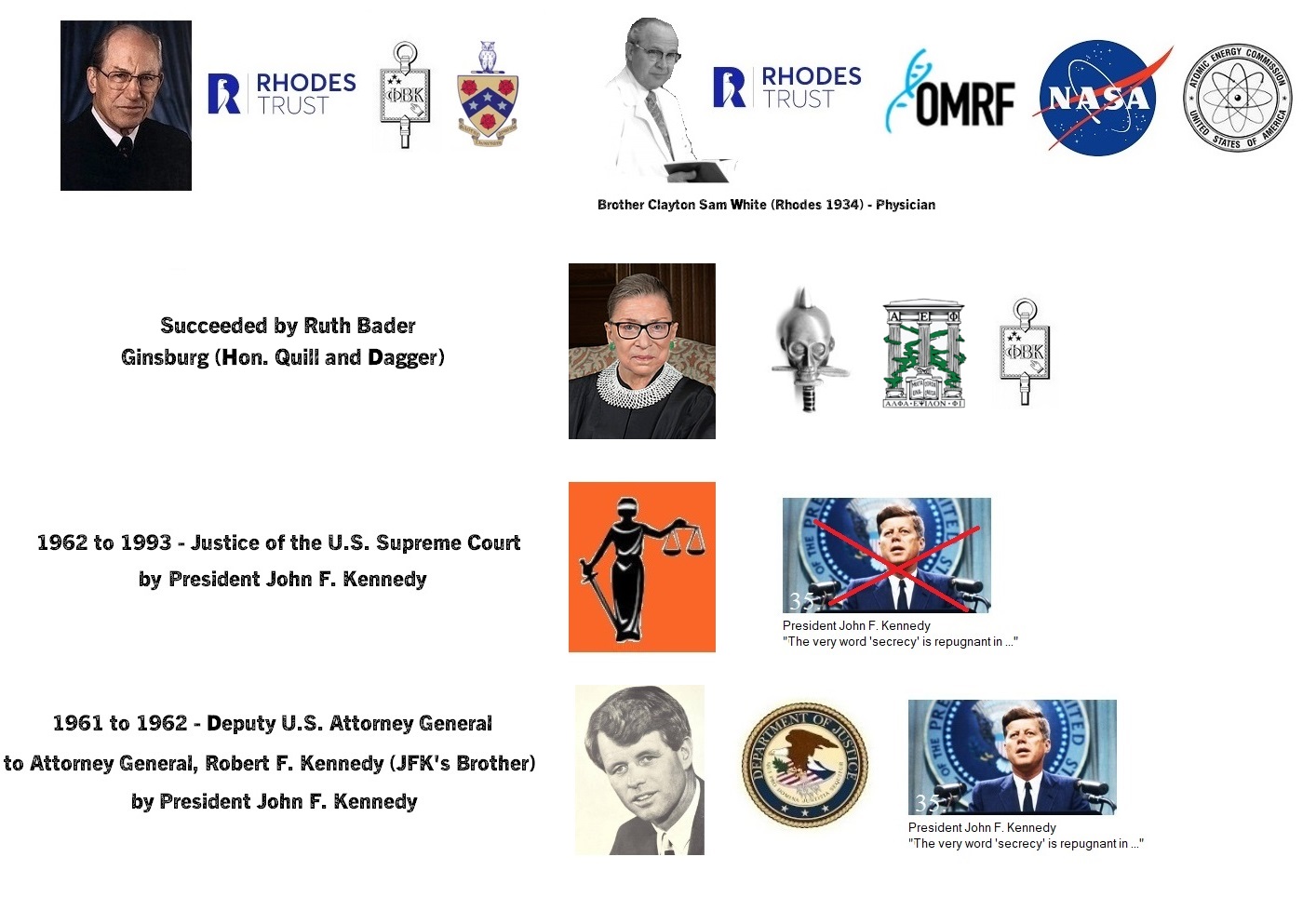
Byron Raymond White (Rhodes 1938)
Democratic. University of Colorado Boulder. Phi Gamma Delta. Rhodes Scholar, Hertford College, University of Oxford. Yale Law School.
White was a legal technician, committed to national power and generally sympathetic to the claims made by lawyers associated with the Democratic coalition.[6] Potter Stewart [S&B 1937] and Byron White, became known as possible swing justices, who would sometimes join with some of the Nixon Justices to issue more conservative decisions.[6]
Considered moderate or relatively conservative.[5]
His dissents in Miranda v Arizona and Roe v. Wade and his majority opinion in Bowers v. Hardwick are just a few examples of opinions that angered liberals. White [Rhodes 1938] supported integration and black voting rights but would not grant individual rights claims in most cases. Scholars have found it difficult to categorize White [Rhodes 1938] within the conventional conservative/liberal framework. Trained in legal realism, White was less concerned with writing theortically justified opinion than with the practical functioning of law. He retired in good health after thirty-one years on the Court and occasionally served as an appeals judge in his final years.[8,p529]
1988 - California v. Greenwood, held that the Fourth Amendment does not prohibit the warrantless search and seizure of garbage left for collection outside the curtilage of a home.[11]
1986 - Bowers v. Hardwick, held. The Constitution does not confer a fundamental right upon homosexuals to engage in sodomy.[9]
1978 - Regents of the University of California v. Bakke, upheld affirmative action, allowing race to be one of several factors in college admission policy. However, the court ruled that specific racial quotas, such as the 16 out of 100 seats set aside for minority students by the University of California, Davis School of Medicine, were impermissible.[12]
1973 - Roe v. Wade, legalised abortion.[5]
1972 - Furman v. Georgia, capital punishment - … Justice Thurgood Marshall would have gone further and held that capital punishment under any circumstances violated the Constitution because the death penalty “shocks the consciences and sense of justice of the people” and “is morally unacceptable to the people of the United States at this time in their history”. Justices William O. Douglas [Beta Theta Pi], Potter Stewart [S&B 1937], and Byron White [Rhodes 1938] did not go so far but did not believe they had to… Stewart [S&B 1937] felt that the moral authority of the Court’s pronouncement would end the issue. States would not revisit capital punishment, and the Court would never again have to face the issue. Even the dissenting Chief Justice Warren Burger agreed; privately, he predicted that there would never be another execution in the country. How they were wrong. Over the next four years, thirty-five states and the federal government enacted new death-penalty laws. And the Court bowed to that legislative judgement, with only the two remaining members of the liberal wing of the Warren[Freemason] Court dissenting. [8,p442]
1967 - Reitman v Mulkey … Held: The California Supreme Court believes that Art. I, § 26, which does not merely repeal existing law forbidding private racial discrimination, but authorizes racial discrimination in the housing market and establishes the right to discriminate as a basic state policy, will significantly encourage and involve the State in private discriminations. No persuasive considerations indicating that the judgments herein should be overturned have been presented, and they are affirmed. Pp. 387 U. S. 373-381.[10]
1967 - Camara v. Municipal Court of the City and County of San Francisco
1966 - Miranada v. Arizona, which established a code of conduct for police during interrogations.[5]
12 Apr 1962 to 28 Jun 1993 - Associate Justice of the U.S. Supreme Court of the United States.
20 Jan 1961 to 16 Apr 1962 - 6th U.S. Deputy Attorney General by President John F. Kennedy.
Preceded by Lawrence Walsh (Davis Polk & Wardwell). Succeeded by Nick Katzenback (Rhodes 1947)
1961 - Assistant Attorney General under Robert F. Kennedy.[5]
1960 - Active in the Presidential Campaigne of John F. Kennedy.[5]
Clerk for Chief Justice Fred Vinson (Freemason. Alpha Delta, Phi Delta Theta. Died in office. Age 63)
WW2 - Lieutenant Commander, Intelligence,United States Navy, Pacific Theatre. Bronze Star. (Colorblind)
During his time in England, he became acquainted with Joe and John Kennedy, as their father Joseph Kennedy was the U.S. Ambassador to London (8 Mar 1938 to 22 Oct 1940).[3]
Died 15 Apr 2002, from Not Known. Age 84.
Note: Brother … Clayton Samuel White (Rhodes 1935)
[2] - FYI - Wiki - Byron Raymond White (Rhodes 1938)
[3] - USA Today - Ex-Supreme Court Justice Byron White dies
[4] - Behind the Lodge Door: The Church, State and Freemasonry in America By Paul A. Fisher
[5] - Britannica.com - Byron Raymond White (Rhodes 1938)
[6] - Backup - Wiki - Byron Raymond White (Rhodes 1938)
[9] - Bowers v. Hardwick (1986)
[10] - Reitman v. Mulkey, 387 U.S. 369 (1967)
[11] - California v. Greenwood, 486 U.S. 35 (1988)
[12] - Regents of Univ. of California v. Bakke, 438 U.S. 265 (1978)
[13] - Find a Grave - Byron Raymond White (Rhodes 1938)



Comments